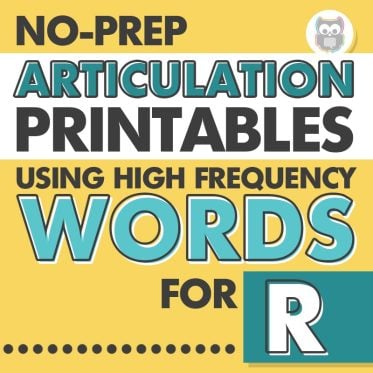There are SO MANY ways to target articulation (and language!!) that don’t involve our artic kids finding words from text passages or just “focusing on their sounds” during other, unrelated activities. My favorite words for speech sound or articulation therapy are high frequency, and they can be found everywhere, all the time!
New Research on Articulation Intervention Intensity
A recent study showed that children with mild-moderate speech sound disorders who received (3) 5-minute individual sessions per week made the same gains as children receiving (2) 30-minute groups sessions per week. Not only that, but
- Students missed less class
- Less demand on teachers to catch students up
- 5-minute sessions are easier to make-up when missed
The key thing is that the students must receive enough therapy trials in those quick sessions (students in the study had an average of 41 repetitions of words in speech therapy sessions!). My favorite way to get lots of repetitions is through my no-nonsense No Prep Articulation Printables Using High Frequency Words. You’ll have no problem getting the maximum number of repetitions in during speech therapy. Plus, you’re practicing words your kids hear and say All. Day. Long.
Words in Speech Therapy Suggestions
What words in speech therapy should we focus on? Here’s some ideas from my high-frequency articulation packets:
- Target /z/ while making words plural! Tons of words are pronounced with a final /z/ when they become plural!
- Target /s/ while working on suffixes and root words including -ing and -self/selves.
- Target /l/ while targeting the suffix -ly. Discuss how the word changes when you add that suffix!
The double bonus when doing these types of activities is that you’re likely to be targeting words your students will encounter and use throughout their day! That’s always a bonus in my book!
So what works best for me with /r/ therapy? I’ve had the most success with drill-based, no fluff activities using ~3, 5-10 minute sessions each week.
I tend to not put these students into mixed groups until they’re at least at the sentence level. Instead, I do quick artic groups right after recess so my students barely miss any class time!
Motivating Tools for Articulation Practice
When I released my no-prep, no-frills, high frequency words articulation packet, I got a few questions about how I keep my students motivated. Here are a couple of my “tricks”:
- Timers – Everyone is more motivated to work and work quickly when they have a timer. I use this same strategy during my work from home days!
- Counters – My students love setting a goal for each session (e.g., 50 correct productions). Once they hit their goal, we’re done working! These counters are cheap and super motivating.
- Apple Watch Counter – Did you know there’s free apps for an Apple Watch, iPhone, and/or iPad that function as a simple counter? My students are way more motivated when they get to use tech. Sometimes, I’ll even let them wear my watch for a sesson (to keep track of productions) which is incredibly motivating!
Buuuuut, the biggest tool in my toolbox for keeping my students motivated is…. ME! ⭐️ *Most* (keyword: most… because it’s middle school so it really can’t be *all*) of my students love coming to speech because of my attitude, my support, my encouragement, my positivity, and most importantly, my energy.
I work incredibly hard to get myself into the right mental headspace before each session so that I can be the SLP I need to be to keep my students motivated and working. YOU are the most effective therapy material you’ve got!
My High Frequency Words for Speech Therapy Packet
The words and phrases in my No Prep Articulation Printables Using High Frequency Words packet are all FUNCTIONAL and high-frequency. I love using these words because they’re so much more relatable – my students see these words in their books and even catch themselves using them throughout their day!
For more information:
Byers, B., Bellon-Harn, M., Allen, M., Saar, K., Manchaiah, V., & Rodrigo, H. (2021). A Comparison of Intervention Intensity and Service Delivery Models With School-Age Children With Speech Sound Disorders in a School Setting. Language, Speech, and Hearing Services in Schools.
If you’re interested in getting my email newsletter, you can sign up below! I email around 3 times a month about sales, new product releases, and helpful SLP insights! I’d love to have you!





















Leave a Comment